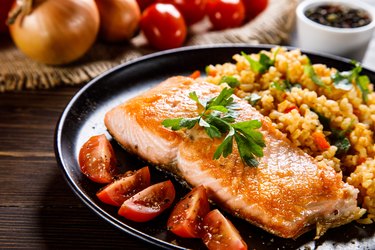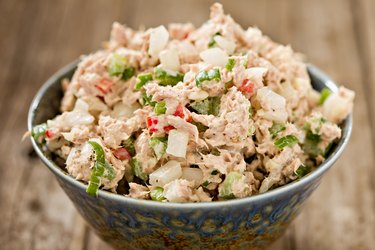
You may have heard that plant-based eating is the new trend and it's the type of eating health professionals everywhere are cheering about. But plant-based eating doesn't mean you have to make the commitment to becoming a vegan, and you don't even have to be a full-on vegetarian.
The pescatarian diet is a plant-based diet that gets extra protein and nutrition from two to three servings of fish each week. Here's what to know about the diet and a meal plan to get you started.
Video of the Day
Video of the Day
What Is the Pescatarian Diet?
The pescatarian diet, sometimes called pesco-vegetarian, is a flexible way to adopt a plant-based diet that's brimming with health benefits.
Here's how it measures up against other similar diets:
- Vegan: No animal or animal-derived products whatsoever — that means no meat, dairy, eggs or honey
- Lacto-ovo vegetarian: Avoids meat of all types, but includes milk (lacto) and eggs (ovo)
- Ovo vegetarian: Includes eggs as the only animal-based protein
- Lacto vegetarian: Includes dairy, such as milk, cheese and yogurt, but avoids eggs and meat
- Pescatarian: Vegetarians who eat fish and may also choose to include eggs and dairy
As you can see, there are a ton of options if you want to switch to a plant-based diet. The pescatarian eating pattern can be as rigid or as flexible as you like.
Pescatarian Diet Foods
A balanced pescatarian diet is one that includes a wide variety of foods from all food groups. In order to reap all of the health benefits, stick with whole foods, limit how much you eat away from home and load up on plants.
Foods You Should Eat
- Fruits: Bananas, berries, oranges, kiwi, melons and so many more!
- Vegetables: Broccoli, carrots, potatoes, sweet potatoes, cauliflower, greens
- Nuts: Pecans, cashews, peanuts, almonds and nut butters
- Olive oil
- Whole grains: Brown rice, quinoa, whole-wheat bread, oats, popcorn
- Legumes: All beans and lentils
- Seafood: Eat fish two to three times per week and stick with low-mercury fish such as salmon, tuna, shrimp, sardines and oysters
- Dairy: Milk, cottage cheese, cheese, yogurt
- Eggs
Foods You Should Limit
Moderation is key on the pescatarian diet. There are many foods that you should only eat every once in a while, but few foods that you should avoid completely. It only makes sense if you're going pescatarian for health reasons that you limit foods that may not be benefitting your health.
- Processed, plant-based meat alternatives: These can be high in sodium and fillers
- Added sugar: Candy, cookies, cakes — stick with the American Heart Association recommendation of no more than 6 teaspoons of added sugar per day for women and no more than 9 teaspoons per day for men
- Highly-processed (aka "junk") foods: Chips and foods like it should be eaten in moderation for all diets
- Alcohol: No more than one drink per day for women and two for men, per the AHA
Foods You Should Avoid
When you eat meat-free, you naturally take out processed and cured meats, which should be limited in an omnivore diet anyway. Reading food labels and ingredient lists should become a habit to ensure you're sticking with your new plant-based lifestyle.
- Meat: Poultry, beef, pork and meat from all animals
- Any shelf-stable foods with hydrogenated oils (trans fat): Crackers, boxed pastries and frozen pizza are a few examples (check ingredients list to see if it contains hydrogenated or partially hydrogenated oils — even if the nutrition label says 0 grams trans fat, the food can still have 0.05 grams of trans fat per servings, according to labeling rules from the Food and Drug Administration)

Why Go Pescatarian?
When switching to a pescatarian diet, you get all the health benefits that a vegetarian enjoys, including a reduced risk for:
- Heart disease: According to an August 2019 review published in the Journal of the American Heart Association, people who ate more plants and less meat had a lower risk of heart disease
- Type 2 diabetes: Per a September 2018 review published in Current Diabetes Reports, all types of vegetarian diets reduced the risk of developing type 2 diabetes.
- High blood pressure: According to a May 2017 article published in the Journal of Geriatric Cardiology, vegans and vegetarians had lower blood pressure overall and a significantly reduced risk of hypertension (high blood pressure). This is pretty big news, considering more than 100 million U.S. adults have high blood pressure, according to the AHA.
Plant-based eating also aids in the reduction of body fat (aka weight loss), according to a November 2019 analysis published in Nutrients. That's because this type of eating pattern generally leads to a reduction in calories overall, improved gut health and increased insulin sensitivity.
If environmental concerns are a reason you want to switch to plant-based eating, there is some research to suggest that a meat-free diet has benefits in that area, too. According to a June 2014 study in Climatic Change, meat-eaters had higher greenhouse gas emissions than pescatarians.
Related Reading
Another reason you might find it tempting to switch to plant-based eating with a few servings of fish each week is your bank account. The mainstay of the pescatarian diet is still plant-based foods, such as beans, lentils and plants, which are much more inexpensive than beef and poultry. Two servings of fish each week is still relatively cheaper than eating meat each night. Save money on seafood by purchasing a mix of fresh, frozen and vacuum-packed seafood, such as tuna packets.
Your Go-To 7-Day Pescatarian Diet Meal Plan
Monday
- Breakfast: Start the morning with this fiber-rich Meusli Breakfast Bowl
- Lunch: This Egg Salad swaps out the mayo for yogurt without missing any flavor
- Dinner: Your week should begin with the good dose of omega-3s in this Baked Salmon
Tuesday
- Breakfast: These California Breakfast Burritos are packed with protein to keep you full all morning
- Lunch: Lentils, like those in this Lentil Raisin Spinach Salad, have iron, folate, potassium and more good-for-you nutrients
- Dinner: Take a shortcut with some store-bought salsa verde to make this super-quick and fiber-full Vegan Couscous Verde Bowl with Black Beans and Corn
Wednesday
- Breakfast: On a fish-free day, get your omega-3s from walnuts and flax with a Flaxseed and Yogurt Breakfast
- Lunch: Pack a Greek Orzo Salad that serves up a healthy serving of veggies and heart-healthy olive oil
- Dinner: You won't miss the meat at all with this filling Healthy Vegetarian Quinoa Chili
Thursday
- Breakfast: Make these Granola Breakfast Protein Balls ahead of time for a quick out-the-door breakfast option
- Lunch: Add in some baby kale or spinach for texture with this Sweet Potato Salad
- Dinner: Throw a little firm tofu on the grill with the veggies for more protein in your Grilled Veggie Quinoa Salad
Friday
- Breakfast: Fuel your pre-weekend body with this High Protein Chocolate Breakfast Smoothie
- Lunch: An easy way to get in more seafood, this Crunchy Tuna and Feta Salad packs up easily for a work lunch
- Dinner: Add even more veggies to this Cauliflower "Fried Rice" Entree and serve up a side of fruit for a complete dinner
Saturday
- Breakfast: A Smoked Salmon Breakfast Sandwich is the perfect option for weekend brunch
- Lunch: These Buffalo Cauliflower "wings" are the perfect party food — pair with fresh celery and carrots and a yogurt-based dipping sauce
- Dinner: Plant-based eating is never boring with these Falafel Chickpea Burgers
Sunday
- Breakfast: With this Southern-Style Green Breakfast Skillet, you'll get your greens in early
- Lunch: Double up on the greens with a Chickpea and Pine Nut Salad, and add a side of fresh fruit for a complete meal
- Dinner: Load up on antioxidants with a flavorful Spicy Rainbow Quinoa Buddha Bowl
Related Reading
- Federal Register: "Food Labeling: Trans"
- American Heart Association: "Added Sugars"
- Journal of the American Heart Association: "Plant‐Based Diets Are Associated With a Lower Risk of Incident Cardiovascular Disease, Cardiovascular Disease Mortality, and All‐Cause Mortality in a General Population of Middle‐Aged Adults"
- Current Diabetes Reports: "Vegetarian Diets and the Risk of Diabetes"
- Journal of Geriatric Cardiology: "A Plant-Based Diet and Hypertension"
- American Heart Association: "More Than 100 Million Americans Have High Blood Pressure, AHA says"
- Nutrients: "Plant-Based Diets in the Reduction of Body Fat: Physiological Effects and Biochemical Insights"
- American Heart Association: "Drinking red wine for heart health? Read this before you toast"
- Climatic Change: "Dietary Greenhouse Gas Emissions of Meat-Eaters, Fish-Eaters, Vegetarians and Vegans in the UK"